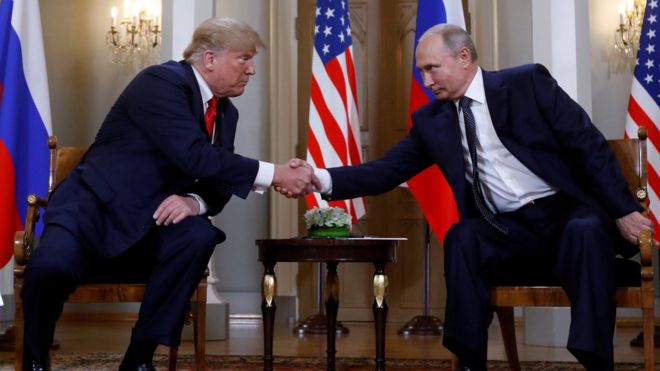Where in the World is Elena Khusyaynova?
By
Quinta Jurecic
Friday, October 26, 2018, 10:17 AM
A tweet allegedly sent by a member of the conspiracy in connection with which Khusyaynova was charged, as reproduced by the Justice Department.
On Monday, Oct. 22, a Russian media outlet known as the Federal News Agency (FAN) published a video of a round-faced woman sitting at a desk, looking directly into the camera. Her name, she announced, was Elena Alekseevna Khusyaynova, and she was FAN’s accountant. Three days earlier, the United States had unsealed court documents charging her with involvement in a Russian conspiracy to influence both the 2016 presidential election and the upcoming 2018 midterm elections.
The video was also published with English subtitles on USA Really, an English-language website
linked to the Kremlin and
identified by the Daily Beast as a subsidiary of FAN. Khusyaynova’s statement was an exercise in trolling: She expressed innocent surprise at the charges against her and voiced her wish for America to be made great again.
Perhaps this kind of thing shouldn’t be surprising coming from an employee of an entity described by the Justice Department as having engaged in a years-long influence operation carried out through politically incendiary posts on social media. But given the specific procedural mechanisms used by prosecutors handling the case, the video is very odd indeed. It suggests that—if the person in the video is who she says she is—Khusyaynova has not been arrested either by the U.S. or by any cooperating law enforcement agency and is still in Russia. And that’s incongruous with the manner in which the government charged her in the first place.
The docket in Khusyaynova’s case in the U.S. District Court for the Eastern District of Virginia shows that the government filed the complaint and affidavit and obtained an arrest warrant on Sept. 28. At that point, the case was sealed from public view.
Prosecutors typically charge defendants using criminal complaints when the government needs to make a sudden move. To secure an indictment, a prosecutor must convince a grand jury that the government has presented probable cause that the defendant committed a crime, while use of a complaint allows the government to proceed only by alleging probable cause through an accompanying affidavit. Indictments offer certain procedural benefits for prosecutors over complaints, but the lack of the additional hurdle of going before a grand jury means that a complaint can make for a better—faster and more agile—tool in a pinch. This is almost certainly why accused Russian spy Maria Butina was
charged by a complaint, rather than an indictment—investigators feared that Butina was preparing to flee the country, according to
court documents.
The complaint in Butina’s case was kept under seal until she was successfully taken into custody, consistent with law enforcement’s not wanting to tip its hand in advance of an arrest. So, too, with the complaint against Khusyaynova—except that, a month after a warrant was issued for her arrest, the FAN accountant appears to remain a free woman. The video doesn’t indicate her location, but presumably Khusyaynova is somewhere sufficiently shielded from the law enforcement agencies of the United States or cooperating nations that she feels comfortable mocking the criminal charges against her. Of course, it’s possible that the woman in the video is not in fact the woman described in the complaint, but there’s no other sign that Khusyaynova is in custody, and by now there surely would be if that were the case.
What’s more, the complaint against Khusyaynova has now been unsealed, which suggests that law enforcement may have given up hope of arresting her—though it’s not obvious why the government moved to unseal the complaint in the first place. There are several stories that can be told to fit this set of facts: Perhaps, for example, the government might have moved quickly in the hope of taking advantage of a hypothetical trip by Khusyaynova outside Russian borders and into a jurisdiction friendly to U.S. law enforcement, only for the opportunity to fall through. Notably, however, this doesn’t explain why the complaint was unsealed.
But at the moment, the facts are sufficiently sparse that the only thing clear is that there’s a puzzle piece missing. Analyzing the Khusyaynova complaint on the day it was unsealed, a group of writers on
Lawfare, including me,
advised readers to “[l]ook for the answer to one set of questions”: “Where is Elena Alekseevna Khusyaynova, and is she a free woman?” The public now seems to have an answer to this—at least in part. The question now is
why.
Topics:







